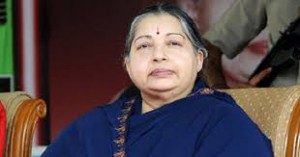Jayalalithaa to remain in jail, bail petition adjourned till October 7
 BANGALORE: In a fresh setback to jailed All India Anna Dravida Munnetra Kazhagam (AIADMK) supremo Jayalalithaa, the vacation bench of the Karnataka High Court on Wednesday posted for October 07 hearing on her pleas for suspension of the sentence and immediate bail in the disproportionate assets case
BANGALORE: In a fresh setback to jailed All India Anna Dravida Munnetra Kazhagam (AIADMK) supremo Jayalalithaa, the vacation bench of the Karnataka High Court on Wednesday posted for October 07 hearing on her pleas for suspension of the sentence and immediate bail in the disproportionate assets case
In the wake of today’s order, the former Tamil Nadu chief minister will have to stay in prison for at least six more days.
“In my considered opinion, hearing on this petition should be referred to a regular bench of the high court,” special bench judge Justice Rathnakala told defence counsel on the criminal revision petition. Declining to hear defence counsel Hashmath Pasha, the judge said there was no need for a special bench to hear the revision petition.
“A regular bench of the high court should hear the petition, as it is not appropriate for the special bench to consider the matter, which requires a thorough review,” Rathnakala reiterated and posted the case for hearing to October 07, as October 06 has been declared holiday for Eid festival.Upset over the adjournment, a team of pro-Jayalalithaa lawyers staged a protest demonstration outside the court.
“We made special efforts to advance the case hearing to Wednesday from October 6 for getting immediate relief to Jayalalithaa. We are disappointed by the ruling of the special bench to adjourn it on October 7,” one of the lawyers told reporters.
Revision petitions of other three persons – Sasikala Natarajan, VK Sudhakaran and J Ilavarasi, who were also convicted and sentenced for four years’ imprisonment along with Jayalalithaa, were also adjourned to October 07.
As Jayalalithaa sought immediate relief, the Court had on Tuesday first posted the hearing for October 06 but hours later listed the matter for today after her counsels pleaded for urgent hearing.
When the matter came up before the vacation bench judge Justice Rathnakala, Jayalalithaa’s counsel Ram Jethmalani pleaded for suspending the sentence pending appeal under Section 389 of the Criminal Procedure Code and for her release on bail.
Section 389 states that pending any appeal by a convicted person, the Appellate Court may order that the execution of the sentence or order appealed against be suspended. Also, if the person is in confinement, that he or she be released on bail, or on own bond.
During the brief hearing, Special Public Prosecutor Bhavani Singh filed the objections to Jayalalithaa’s pleas and also a memo about his appointment as the SPP in the case.
Singh, who was SPP in the Special Court in the disproportionate assets case, had told the court yesterday that he had not yet received any official notification appointing him as the SPP for the criminal appeal filed in the High Court.
As Singh sought more time, the judge had first posted the matter for hearing on October 6, which was later rescheduled for today following pleas by Jayalalithaa’s counsels.
Jayalalithaa’s aide Sasikala, her relatives VN Sudhakaran, disowned son of the former chief minister, and Ilavarasi will also have to spend at least six more days in jail as their petitions for bail and suspension of the sentence were also adjourned for October 7.
The High Court is on Dasara holidays from September 29 to October 6. October 07 is also a government holiday on account of Bakrid.In her petitions seeking immediate bail and challenging her sentence, Jayalalithaa has maintained that the charges of amassing wealth against her were false and that she had acquired property through legal means.
Jayalalitha has also contended that the trial court has overlooked several judgements and has not considered the binding nature of various income tax orders and decisions of the Income Tax Appellate Tribunal, which had accepted the income and the level of expenditure pleaded by her.
A special court here on September 27 convicted 66-year-old Jayalalithaa in the Rs 66 crore disproportionate assets’ case and sentenced her to four years’ simple imprisonment, with a fine of Rs 100 crore under the Indian Penal Code (IPC) and the Prevention of Corruption Act.

